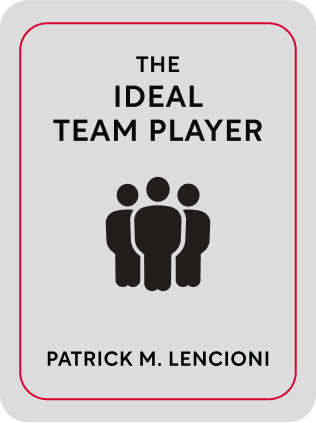

This article is an excerpt from the Shortform book guide to "The Ideal Team Player" by Patrick M. Lencioni. Shortform has the world's best summaries and analyses of books you should be reading.
Like this article? Sign up for a free trial here .
What is The Ideal Team Player about? What are the key qualities of an effective team player, according to its author Patrick Lencioni?
In his book The Ideal Team Player, author and business consultant Patrick Lencioni explains how to spot, hire, and coach a model team player. Building on his previous book, The Five Dysfunctions of a Team, which focused on group dynamics, he defines three essential personal qualities or “virtues” the ideal team player embodies—humility, hunger or drive, and people skills.
Below is a brief overview of the key concepts and takeaways.
The Ideal Team Player: How to Recognize and Cultivate The Three Essential Virtues
One of the most important ways to succeed in business and life is by developing the ability to be a team player. Yet ideal team players are uncommon. As leaders, we say we want team players, but we often can’t clearly define the individual qualities we’re looking for.
In his book The Ideal Team Player, Patrick Lencioni defines three essential personal qualities of a team player (humility, hunger, and people skills) and explains how these three simple traits combined can transform any organization through a fictional story of a man who takes over his uncle’s troubled construction company.
In the fable, Jeff Shenley takes over Valley Builders, which has just won two major building projects, at a time when the company is being hamstrung by infighting and lack of clarity about what’s expected of employees. Jeff turns the company around by defining the ideal team player and developing those qualities in employees.
The Three Virtues of a Team Player
In the book Good to Great, author Jim Collins writes that successful companies prioritize hiring the “right” people—those who fit the company’s culture. But many leaders hire for skills and competence instead. (Shortform note: Read our summary of Good to Great here.)
For organizations committed to a teamwork culture, the right people are ideal team players who are humble, hungry, and smart.
While the virtues sound simple, developing and living them is more complicated. Many people have one or more of the qualities, but fewer possess all three. A team member who lacks just one quality can hold back or derail a team. Here’s a closer look.
1) Humble
Great team players focus on the success of the team rather than personal interests. They lack overbearing egos or an obsession with status. They don’t try to get attention and readily give credit to others.
There are two kinds of non-humble people, who seem different but have a common underlying issue—insecurity:
- Arrogant, ego-driven people who try to make themselves the center of attention. They are less confident than they appear, so they try to overcompensate with bluster. They undermine teamwork by stirring resentment, creating division, and playing politics.
- People who lack self-confidence and downplay their contributions and abilities. Others may see them as humble because they’re self-effacing, but people who are truly humble neither overrate nor underrate themselves.
2) Hungry
People who are hungry are driven to seek more work and responsibility. They’re always looking ahead to the next step or opportunity. They’re committed to the work and willing to go above and beyond—for instance, working outside regular hours—when necessary. Managers don’t have to push or monitor them because they’re self-motivated and conscientious.
3) Smart
Being smart in a team context doesn’t refer to intelligence but having common sense when it comes to dealing with people. Those with people skills understand where others are coming from. They ask questions and listen attentively. They are aware of group dynamics and of the impact of their words and actions on others, and they act appropriately for the circumstances.
Assessing People
You can improve the effectiveness of a team by assessing how people measure up to the virtues of an ideal team player, and by helping those who fall short to develop the right qualities or move on to something else. People typically fall into the following categories:
1) None of the virtues: People who lack all three aren’t likely to develop into team players. They’re rarely hired, however, because they stand out as the jackasses that no one wants to work with.
2) One of the virtues: Someone who has only one of the three qualities will have a tough time developing the other two, but it’s possible. These people can be:
- Humble only (“Pawn”): People who are humble without being smart or hungry are of little use to the rest of the team.
- Hungry only (“Bulldozer”): People who are hungry or driven but lack humility and interpersonal skills tend to bulldoze over others in their determination to achieve their own interests.
- Smart only (“Charmer”): Those who have people skills but lack humility and drive are personable but lack true interest in helping colleagues or the team.
3) Two of three virtues: People with two out of three virtues have a good chance of becoming ideal team players. They can be:
- Humble and hungry, not smart (Inadvertent troublemaker): They’re hard workers but clueless about how their words and actions come across. Colleagues get tired of cleaning up the problems they create.
- Humble and smart, not hungry (“Slacker”): These people get along well with others but they do only enough to get by.
- Hungry and smart, not humble (“Politician”): These people are ambitious and may at first appear to be humble, but they work for their own interests. They use other people.
Hiring Team Players
The best way to strengthen teamwork is to make sure everyone you hire is an ideal team player. By focusing your interviews on behaviors that demonstrate the three virtues, you can usually identify team players. There are many guides available for framing behavioral questions. Beyond that, here are some ways to structure the interview process:
- Ask specific questions: Typical interviews follow a generic format and questions that provide only a general sense of the candidate—for instance, you come away thinking, “She seems capable.” However, you need to ask specific questions that uncover whether the candidate has the qualities and behaviors of a team player. For example, to assess whether a person is humble, ask them to describe their most important career accomplishments. They should use the word “we” more than “I.”
- Compare Notes: In many companies, various managers interview the candidate separately and don’t discuss what they learned until the interview process has ended. Instead, debrief managers immediately after an interview on whether the candidate seemed humble, hungry, and smart. Then use the next interview to ask follow-up questions on issues raised in the first. For example, if the first two interviewers agree that the candidate is hungry and smart, the third interviewer should focus on assessing humility.
- Repeat questions: The first time you ask a question, you often get a generic answer. If you ask again in a different way, you may get more details or a different answer. If you ask a third time, but you’re more pointed, you may get the most honest response.
- Ask what others would say: Ask candidates what others would say about them—for instance, instead of asking someone if he considers himself a hard worker, ask how colleagues would describe his work ethic or his level of humility. Candidates tend to give more honest answers to questions framed this way, perhaps because they think you might ask their colleagues the same question and compare answers.
- Pay attention to hunches: If you have a hunch that a candidate has a problem being humble, hungry, or smart, keep digging until you resolve your doubt.
Helping Employees to Develop
For employees to improve, leaders must consistently point out when they’re not doing what’s needed. It’s uncomfortable to repeatedly tell employees they’re missing the mark, but it’s the only way to get results. They’ll succeed or decide to leave—or you’ll have to terminate them.
To help people develop one of the virtues, here are some approaches:
Humility: Some employees can improve if they simply start acting differently, practicing the behaviors they need to develop. For instance, they can push themselves to compliment someone or admit a mistake. Have teammates encourage the employee by highlighting the positive behaviors—for instance, a coworker might say, “I appreciated your compliment the other day …”
Hunger: Everyone, but especially unmotivated people, should have performance goals.
But beyond telling someone to meet certain production goals, managers should set behavioral expectations. Tell unmotivated employees that they also need to help colleagues or the team meet their goals. This may include taking on additional responsibilities or working more hours. With specific goals, the employee will either step up or find another job.
People skills: Those who lack interpersonal skills aren’t usually intentionally being difficult or trying to cause problems. They just don’t pick up on how their words and actions affect others.
When they do the wrong thing, immediately call attention to it. For example, you might say, “Your email really upset your coworkers. Before you send an email next time, you might want to have someone look over it and help you reword it.”
Embedding Teamwork in Your Culture
Besides helping individuals become humble, hungry, and smart, it’s important to embed these values in your company’s culture. Here are some ways to do that:
1) Reward people for teamwork: Managers often don’t say anything when employees do what they want them to, but they’re missing an opportunity. Praise rewards and motivates the employee and reminds everyone else of what’s expected.
2) Address violations: When you see behavior that goes against one of the values, whether the misstep is major or minor, let the violator know. Don’t miss opportunities for learning.
3) Talk about teamwork constantly: Talk about your commitment to the three virtues to everyone—customers, partners, vendors, and job candidates. This helps establish the expectation among people dealing with the company that employees will be humble, hungry, and smart and encourages employees to behave that way. As word gets around, the organization becomes known for its culture, and it’s easier to find employees who are a good fit.
While it may sound simplistic or contrived to some, the organizations that are most explicit about a teamwork culture are the most successful in building it.

———End of Preview———
Like what you just read? Read the rest of the world's best book summary and analysis of Patrick M. Lencioni's "The Ideal Team Player" at Shortform .
Here's what you'll find in our full The Ideal Team Player summary :
- The qualities of a model team player
- How to transform your organization by developing your current employees into team players
- How to make sure you hire team players in the future






